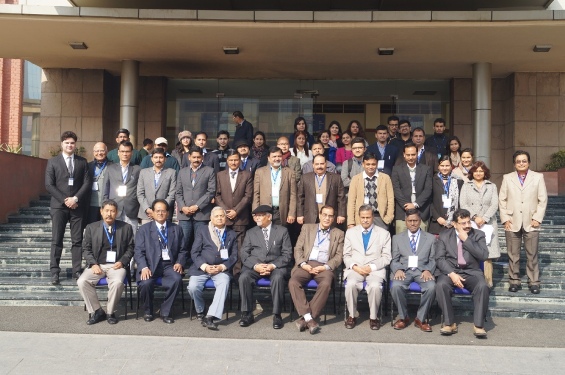16 Jan 2015|Noida | Amity campus
Amity University conducts Two Days Training Workshop for Forest Officers on topic “Issues involved in Man-Animal Conflict – Strategies for Mitigation”

Amity Institute of Wildlife Sciences started two Days Training Workshop for Forest Officers on the topic “Issues involved in Man-Animal Conflict – Strategies for Mitigation” at Amity campus, Sector 125 Noida to educate the participants about the scope of Social & Anthropological aspect in wildlife conservation.
The workshop was inaugurated by Chief Guest Mr. Vinod Ranjan, Additional Director General, Ministry of Environment, Forests & Climate Change and Special Guest, Mr. P R Sinha, Representative, International Union for Conservation of Nature India.
The workshop witnessed the participation of Practitioners, Field Officers, Researchers, Academicians and Students.
Welcoming the guests and participants, Dr. N.P.S Chauhan,Director, Amity Institute of Wildlife Sciences said that in India, there is an exponential growth of population which has been affecting the wildlife habitat. He further added that India has a varied and rich wildlife which should be both protected and conserved. Dr. Chauhan mentioned that Human-wildlife conflict and local dependence on forest resources is a growing problem. He emphasized that the conflict is not restricted to particular geographical regions or climatic conditions but is common to all areas where wildlife and human population co-exist and share limited resources. “The need of the hour is to handle these challenges with integrated approach that recognizes the interconnection of social and anthropological approach for conservation.” implored Dr. Chauhan. He expressed his hope that the workshop would be productive and beneficial in all aspects for the participants attending the workshop.
Addressing the gathering, Dr. W Selwamurthy, President, Amity Science Technology and Innovation Foundation said that both heavy human density and wildlife face a lot of challenges as they share the same resources that are finite in number. He added that traditional sociology and anthropology looks after the human behavior, evolution, societal evolution but there is little space for wildlife concerns. Sharing his views on sustainable development, he said that sustainable development largely depends upon inclusive growth of both human beings and animals. Therefore, it is very important to conduct such workshops to create awareness on the staple role of social and anthropological aspects for conservation of wildlife.
Enlightening the participants on man-animal conflict, Mr. Vinod Ranjan said that in present time, man-animal conflict and its mitigation is an important issue for the survival of human beings. He added that years back, humans had accepted the existence of wildlife in harmony but dense human population in close vicinity to nature reserves pose threats to the subsistence of wildlife. He mentioned that survival of man is assured with the co-existence of wildlife species. Mr. Ranjan expressed that the deliberations during the conference will lead to new strategies and innovations towards mitigation.
Sharing his views on conservation scenario in India, Mr. P R Sinha said that India is home to a large range of flora and fauna. The country has a wide array of wildlife animals and birds that live in a diverse environment. He added that the careless interference of humans with the environment has resulted in the extinction of many species. He mentioned that various active projects by Government and NGOs such as Project Tiger or Project Elephant are important and have benefitted the wildlife conservation to some extent.
During the occasion, Chief Guest Mr. Vinod Ranjan, Special Guest Mr. P R Sinha and Dr.W. Selvamurthy released the study material.
During the two days training workshop various topics will be discussed including “Wildlife damage Problems and Control Methods”, “Ensuring Long term Conservation of Tigers in Corbett Landscape”, “Human-elephant Conflicts in India: Scale and Options for Management”; “Community based mechanism to mitigate human carnivore conflict around Corbett Landscape, Uttarakhand” amongst several others.